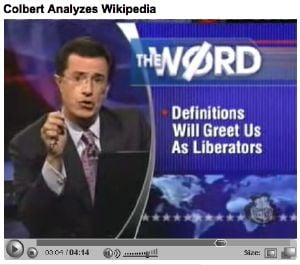This article is more than 1 year old
Jimbo announces Team Wikipedia: 'Global News Police'
Quis custodiet ipsos custodes?
Comment When Henry Kissinger received the Nobel Peace Prize against the backdrop of the US Air Force's secret bombings in Cambodia, the satirist Tom Lehrer declared that satire had become obsolete. If satire died that day, then Jimmy Wales has dug it up, exhumed the corpse, and is giving it a state funeral.
The Wikipedia co-founder has announced a Global News Police Force: new “community driven” global journalism project called Wikitribune, which he says is needed to combat “Fake News” by pronouncing on the accuracy of other people’s news stories. Although the site is apparently live, in the spirit of not-quite-total transparency, you’re not allowed to see it yet; the news was leaked to Jimbo-friendly media including WiReD, the BBC and the Financial Times.
It's both a rival to professional news organisations, and, as Wales admits, a gatekeeper. The site will employ professional journalists, and armchair fact-checkers, to create the real truth.
So what could possible go wrong?
Most obviously, Wales’ credentials come from co-founding Wikipedia, which has incubated and propagated some of the world’s longest running hoaxes. (We celebrated 16 of the best, of the site’s 16th birthday). As Andreas Kolbe wrote:
“It seems inevitable that countless unfathomed myths hatched in Wikipedia's backwaters will (or have) silently become accepted knowledge. Writers copying other writers' errors is hardly a new phenomenon in the history of knowledge, but Wikipedia's accessibility, monopoly, search engine reach and uniquely vulnerable crowdsourcing process is.”
Wikipedia, among other things, inspired another satirist, Stephen Colbert, to coin the phrase “truthiness*”.
“Truthiness is what you want the facts to be, as opposed to what the facts are. What feels like the right answer as opposed to what reality will support,” he declared in 2005. He saluted Wikipedia for allowing you to change the truth to suit you, creating "Wikiality" (US readers can see this geo-fenced Comedy Central clip) ".

Colbert in 2006
Nor is the “community driven” necessarily a guarantee of objective detachment. The Wikimedia Foundation employs lobbyists. Wikipedia’s community drove the site to align with political causes, including the SOPA blackout. Pages on causes dear to Wikipedians have a distinct bias.
Secondly, there’s the question of Quis custodiet ipsos custodes?, which we looked up on the internet, and discovered means “who stole the custard?”
Wales openly admits that Wikitribune will perform a “gatekeeper function” - he can’t realistically deny it. So who are the people who seek to control what you will read?
It isn’t promising. Wikitribune’s advisors include a coterie of internet gurus or “thinkfluencers”, who are not very much enamoured with transparency. These include Professor Lawrence Lessig, Professor Jeff Jarvis and the ubiquitous Lily Cole. All have expressed an egotistical annoyance with the media for not covering them and their ideas in a positive light. Jarvis gets angry with the witty parody Twitter account which took his name.
“I’ve fucking had enough of it. You've had your fun, mate,” the journalism professor warned, ominously, in 2014. That’s just the person you want overseeing a cool objective gatekeeper function, is it not?
Why ‘Fake News’ flourishes
Rather than appoint Jimmy Wales and his gatekeepers as global internet news police, there may be other solutions to an unhealthy news market.
The professional news industry’s over-reliance on advertising online has found itself competing with low quality clickbait sites. Facebook is keen to push “news” at its audience, and established what it called a "News Feed" recently.
Originally the site used human labour, but concerned by accusations of bias, dismissed them and replaced them with an algorithm. The algorithm was rapidly gamed by clickbait sites. One operation run by teenagers in Macedonia maintained one hundred domains churning out sensational but bogus “stories”.
So “fake” news is real enough, although its influence is much more doubtful. It presupposes that the voter is so easily and directly influenced, that a sensational story or two can change a lifetime of experience and prejudices. No single story featured on Facebook’s News Feed, either real or fake, generated more than one million engagements.
Facebook also offers publishers the opportunity to use its quick-loading "Instant Articles", where you can fill up unsold ad space with display ads from Facebook's Audience Network. Helpful that. The Graun ditched Instant Articles last Friday.
One long-term path, for publishers, lies in finding new revenue models, diminishing the financial incentives for clickbait. There is no middle ground for the punter between free and a subscription, and subscribing itself is tedious, as as I noted in a recent interview. Where’s the one-click wallet where you add new outlets to your reading list painlessly, rather than having to whip out your credit card each time?
In the shorter term, professional organisations could aggressively assert their rights and tell Mark Zuckerberg: if you want our news, you have to pay. Otherwise you’re welcome to all the toxic sludge that Macedonia can create for you. ®
* Lexicographers contend the word had been previously in use, albeit used to convey the opposite sense, in the 19th century, as listed in in the Oxford English Dictionary.
